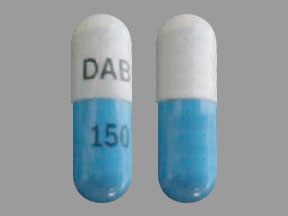
Pradaxa Coupons & Savings Card – Discount Prices from $44.87
Brand for: Dabigatran
My prescription
Edit
150MG, Dabigatran (60 Capsules)
Select pharmacy

CVS
$44.87
COUPON PRICE
Walgreens
$65.52
COUPON PRICE
Albertsons
$69.07
COUPON PRICE
Walmart
$170.99
COUPON PRICEPradaxa savings card
Show this card to your pharmacist
CVS
$44.87
BIN
ID
PCN
GRP
019876
LH449D2A2E
CHIPPO
LHX
Powered by
Related direct-acting oral anticoagulants prescriptions
More prescriptions for stroke risk reduction
Related direct-acting oral anticoagulants prescriptions
More prescriptions for stroke risk reduction
Price history for Pradaxa (brand) & Dabigatran (generic)
60 Capsules, 150MG
Average retail price for Pradaxa
Average retail price for Dabigatran
Average SaveHealth price for Dabigatran
Our price history data is based on aggregated prescription data collected from participating pharmacies in America. Our prescription data updates daily to reflect the latest price changes. If you notice a missing data point, it means there wasn't sufficient data available to generate a monetary value for that date.
Over the last 12 months, the average discount price of Pradaxa is $86.40 using the SaveHealth savings card. That's an average savings of 98.50% on Pradaxa with our discount card.
*Retail prices are based on pharmacy claims data, and may not be accurate when we don't have enough claims.
Pradaxa (Dabigatran) dosage forms
Dosage Quantity Price from Per unit 75MG 1 Capsule $8.86 $8.86 75MG 30 Capsules $31.58 $1.05 75MG 60 Capsules $44.87 $0.75 110MG 1 Capsule $2.15 $2.15 110MG 60 Capsules $44.87 $0.75 150MG 60 Capsules $44.87 $0.75 150MG 1 Capsule $5.31 $5.31 150MG 20 Capsules $27.16 $1.36
| Dosage | Quantity | Price from | Per unit |
|---|---|---|---|
| 75MG | 1 Capsule | $8.86 | $8.86 |
| 75MG | 30 Capsules | $31.58 | $1.05 |
| 75MG | 60 Capsules | $44.87 | $0.75 |
| 110MG | 1 Capsule | $2.15 | $2.15 |
| 110MG | 60 Capsules | $44.87 | $0.75 |
| 150MG | 60 Capsules | $44.87 | $0.75 |
| 150MG | 1 Capsule | $5.31 | $5.31 |
| 150MG | 20 Capsules | $27.16 | $1.36 |
Is Pradaxa the same as Eliquis?
Pradaxa and Eliquis are not the same. They are both anticoagulant medications used to prevent blood clots, but they contain different active ingredients and work in slightly different ways. Pradaxa contains dabigatran, while Eliquis contains apixaban. It is important for patients to follow their healthcare provider's instructions regarding which medication is appropriate for their specific condition.
Is Pradaxa an antiplatelet or anticoagulant?
Pradaxa is an anticoagulant.
What is the drug Pradaxa used for?
Pradaxa is used to reduce the risk of stroke and systemic embolism in patients with non-valvular atrial fibrillation. It is also used to treat and prevent deep vein thrombosis (DVT) and pulmonary embolism (PE) in certain patients.
What is the most common side effect of Pradaxa?
The most common side effect of Pradaxa is bleeding. This can range from minor bleeding, such as bruising or nosebleeds, to more serious bleeding events. It is important for patients to monitor for signs of unusual bleeding and report them to their healthcare provider.
What is the difference between Pradaxa and Eliquis?
Pradaxa (dabigatran) and Eliquis (apixaban) are both anticoagulant medications used to prevent blood clots, but they differ in their mechanisms of action. Pradaxa is a direct thrombin inhibitor, which means it directly inhibits the activity of thrombin, an enzyme involved in blood clot formation. Eliquis, on the other hand, is a factor Xa inhibitor, which works by blocking the activity of factor Xa, another enzyme crucial in the clotting process. Additionally, their dosing regimens, side effect profiles, and specific indications may vary, so it is important for patients to consult with their healthcare provider to determine which medication is most appropriate for their condition.
